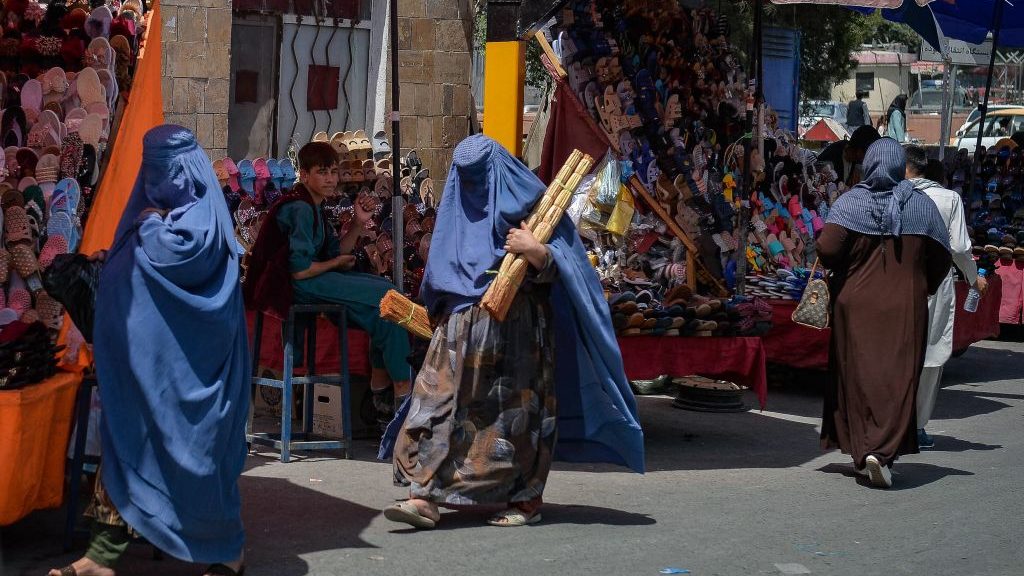The World Marked International Women’s Day, but Not Afghanistan
On the day set aside to celebrate women’s achievements, Afghan women call for the world to intervene and liberate them from the prison they have been put in by the Taliban
The United Nations said on Wednesday that Afghanistan is currently the “most repressive country in the world” for women’s rights. Wednesday marked International Women’s Day and, while demonstrations and events took place worldwide, the streets of Afghanistan remained quiet, as did Afghan women, who say they have no voice and no freedom.
“The world is celebrating International Women’s Day at the same time as Afghan women don’t even have the right to go to university, go to school, have jobs and don’t have the choice of how to dress,” said Selsela, an Afghan lawyer and women’s rights activist.
Today, she told The Media Line, “Afghan women are going through the most difficult days, and we are experiencing some dark times that we had never experienced before.”
Asra is an Afghan women’s rights activist, who worked as a defense lawyer before the Taliban took over the country in August 2021. She lost her job due to the Taliban’s restrictions on women. But she continues to fight for the rights of Afghan women and girls.
Asra told The Media Line that in Afghanistan women are treated like second-class citizens and slaves of society, and that they have lost hope for their future. She says that, in addition to not having the right to work or receive an education, Afghan women cannot even attend social and political activities, and female activists such as herself face danger every day.
We cannot go to the streets. If we go, then they will use force and if we get in trouble there is no one to support us. Unfortunately, we are alone in this war.
That is why women could not organize or attend any activity commemorating International Women’s Day. “Every woman who has social activities or does something to call for their rights will get in trouble,” Asra explained.
In addition, there is not even a physical space in which women could demonstrate or participate in Women’s Day activities.
Give the gift of hope
We practice what we preach:
accurate, fearless journalism. But we can't do it alone.
- On the ground in Gaza, Syria, Israel, Egypt, Pakistan, and more
- Our program trained more than 100 journalists
- Calling out fake news and reporting real facts
- On the ground in Gaza, Syria, Israel, Egypt, Pakistan, and more
- Our program trained more than 100 journalists
- Calling out fake news and reporting real facts
Join us.
Support The Media Line. Save democracy.
“They [the Taliban] have even banned women from parks, all educational places and entertainment venues,” said Selsela. “How can they celebrate it?”
As expected, the Taliban government did not sponsor any Women’s Day activity themselves, she added.
The only space that is still relatively safe for women’s rights activism in the country is social media, which allows anonymity, according to Asra.
“Some female activists continue their activities using social media. Most people do not want to take part in demonstrations as they are afraid of the Taliban and they do not want to put themselves or their families in danger,” she said.
“We try to find other ways to achieve our goals and get our rights. It is not the end, it is the starting point. I see many girls and women changing their way of struggle,” Asra said.
She adds that taking to the streets is a risky possibility. “We cannot go to the streets. If we go, then they will use force and if we get in trouble there is no one to support us. Unfortunately, we are alone in this war,” she said.
The Organization of Islamic Cooperation on Wednesday condemned the Taliban and demanded that they honor their promises regarding women’s rights.
Leaders of the Islamic world reiterated during a “Women in Islam” conference on Wednesday at United Nations headquarters in New York that the privation of women’s rights in Afghanistan is inciting stereotypes and Islamophobia in the global arena and condemned the Taliban for using Islam as the justification of their crimes against women.
“Taliban does everything against women in the name of Islam. So, in this case, Islamic countries and organizations can play a very good role and they have to do something for the Islam religion,” Asra said, adding that “terrorist groups like the Taliban give a bad name to Islamic societies and it will cause Islamophobia.”
She says that during International Women’s Day, she watched an interview on national television during which a Taliban official said: “Our decisions about women’s rights are part of our internal policy and according to the principle of non-interference in the internal affairs of countries, any state or government does not have the right to tell us what to do.” She concludes from this that international condemnations are not the right solution.
Terrorist groups like the Taliban give a bad name to Islamic societies and it will cause Islamophobia
“Today some Islamic organizations condemned the Taliban, but every day I see that most of the countries condemn the Taliban and, still, Afghan women are in the same position,” Selsela reiterates. “They are not helping us. Just labeling the Taliban as a terrorist group is not enough,” she continued, urging the world to take more serious steps against the Taliban regime.
“Today the world is just watching Afghan women from far away, and they have to do something to make a difference,” she added.



